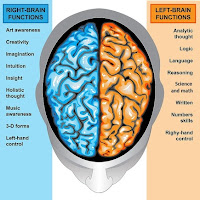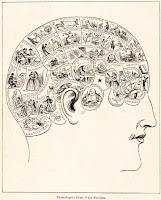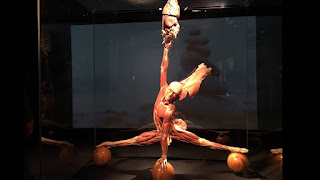Week 7: Neuroscience and Art
Blog #6: Neuroscience and Art
 |
| Left brain vs right brain |
Anther topic I noticed mentioned in this week’s material several times was that of sexuality. Sigmund Freud was adamant about how powerful of a motivator sexuality is, and Timothy Leary endorsed LSD as a powerful aphrodisiac. I think that Jung was correct in his criticism of Freud’s ideas on sexuality because its such a subjective topic — what motivates one person sexually is not guaranteed to translate to anybody else, and some people are not motivated by it whatsoever. The same goes for Leary in regards to LSD.
 |
| Timothy Leary |
Works Cited
Jarrett, Christian. “Why the Left-Brain Right-Brain Myth Will Probably Never Die.” Psychology Today, Sussex Publishers, 27 June 2012, www.psychologytoday.com/us/blog/brain-myths/201206/why-the-left-brain-right-brain-myth-will-probably-never-die.
Kosner, Edward. “Review: Timothy Leary, 'The Most Dangerous Man in America'.” The Wall Street Journal, Dow Jones & Company, 19 Jan. 2018, www.wsj.com/articles/review-timothy-leary-the-most-dangerous-man-in-america-1516320277.
Lechtenberg, Kendra. “Ask a Neuroscientist: Does a Bigger Brain Make You Smarter?” NeuWrite West, 24 May 2014, www.neuwritewest.org/blog/2014/5/23/ask-a-neuroscientist-does-a-bigger-brain-make-you-smarter.
“Left and Right Hemispheres - The Brain Made Simple.” Hippocampus - The Brain Made Simple, brainmadesimple.com/left-and-right-hemispheres.html.
“Phrenology.” Wikipedia, Wikimedia Foundation, 15 May 2018, en.wikipedia.org/wiki/Phrenology.
Shmerling, Robert H. “Right Brain/Left Brain, Right?” Harvard Health Blog, 28 July 2017, www.health.harvard.edu/blog/right-brainleft-brain-right-2017082512222.
Vesna, Victoria. Mind Intro, Lecture I-III. N.d. Video. YoutubeWeb. 14 Nov 2013.




Hi, I really liked how you pointed out some of the theories prevalent in society that evidence has been accumulating against. I recently began to hear about evidence debunking left/right brain theories, too. You're right in that the brain truly is a very complex organ whose processes we are only beginning to understand and model. There is so much the brain can do that we understand and apply (we're literally just a body controlled by a brain) yet we don't truly understand it. It's this cycle of logic that's kind of mind boggling. My favorite thought is that the brain named itself. I think like any field of study, neuroscience and understanding the brain will come with time.
ReplyDelete